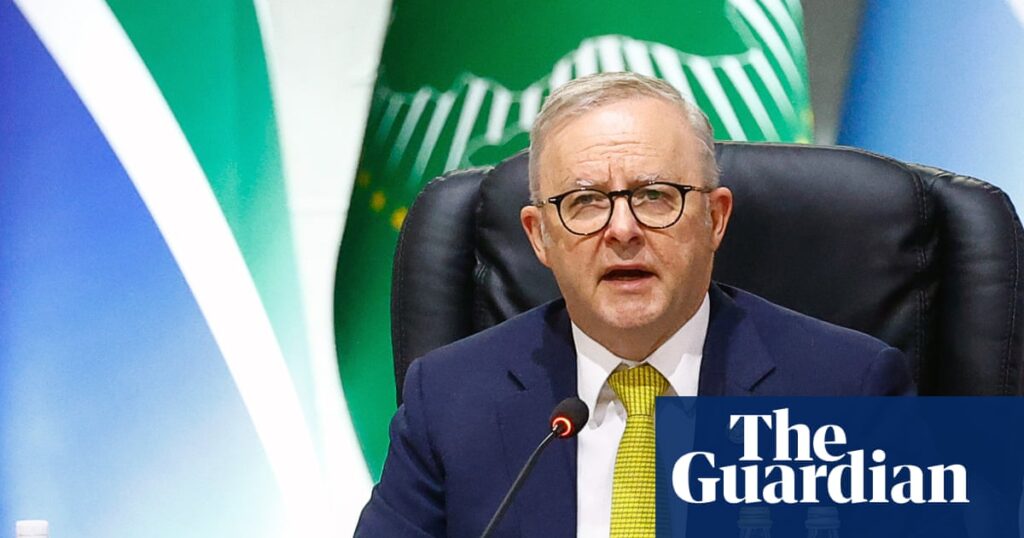
The Albanese government is under increasing pressure to clarify its strategy for phasing out fossil fuels following its endorsement of a global declaration at the UN climate summit. The declaration, signed at the Cop30 conference in Belem, Brazil, calls for a swift transition away from coal, gas, and oil.
Australia’s commitment to the “Belem declaration,” led by Colombia, was made during a side event at the summit, which concluded more than a day past its scheduled end. The declaration aims for a “just, orderly and equitable” transition consistent with limiting global temperature rise to 1.5C above preindustrial levels, a goal that has garnered widespread applause.
Australia’s Contradictory Stance
Despite the declaration’s strong language against continued fossil fuel production, Australia’s resolve was questioned when Prime Minister Anthony Albanese announced plans for new fossil fuel projects, including the Narrabri gas field in New South Wales. At a G20 meeting in South Africa, Albanese sidestepped questions about reducing fossil fuel production and defended a strategy to open new gas fields to meet demand “to 2050 and beyond.”
Albanese highlighted Australia’s ongoing transition in power grids, emphasizing the role of renewables like solar and wind, supported by gas, batteries, and hydropower. However, he omitted mention of Australia’s status as a leading fossil fuel exporter.
Reactions from Climate Activists and Experts
David Ritter, CEO of Greenpeace Australia Pacific, criticized Cop30 for failing to achieve significant global agreements on fossil fuels and deforestation. Nonetheless, he acknowledged the Belem declaration as a pivotal moment, noting that a “critical mass of nations” now recognizes that achieving the 1.5C target requires halting new fossil fuel developments.
“Now is the hour. Australia must now commit to a clear plan and a timeline for the phase-out of fossil fuels, including exports – no more free passes or subsidies for the coal, oil and gas corporations driving climate damage,” Ritter stated.
Bill Hare, chief executive and senior scientist at Climate Analytics, emphasized the importance of Australia’s commitment to the Belem declaration. He urged the government to take concrete actions, such as stopping new fossil fuel projects and integrating climate impact assessments into environmental evaluations.
Global and Domestic Implications
Cop30 concluded with a fragile agreement after contentious debates between over 80 countries advocating for more ambitious climate action and oil-producing nations like Saudi Arabia and Russia, which resisted acknowledging the need to phase out fossil fuels. The transition away from fossil fuels, previously supported at Cop28 in Dubai, remains a voluntary rather than binding commitment.
Looking ahead, Colombia and the Netherlands will co-host the first international conference on a just transition away from fossil fuels in Santa Marta, Colombia, in April. Observers are urging Australia’s climate change minister, Chris Bowen, to attend, given his leadership role in the global negotiations that began at the end of Cop30.
Future Prospects and Challenges
In a recent agreement, Turkey was appointed as the president of Cop31, with Bowen serving as vice-president and president of negotiations. This arrangement grants him “exclusive authority in relation to the negotiations,” although any disagreements between Turkey and Australia are to be resolved through consultation.
Denise Cauchi, CEO of Climate Action Network Australia, expressed frustration over Australia’s limited involvement in substantial negotiations at Cop30, as Bowen and officials focused on hosting arrangements for Cop31. However, she believes Australia can demonstrate leadership by spearheading efforts among wealthy fossil fuel producers to phase out coal, oil, and gas.
As the global community continues to grapple with the urgent need for climate action, Australia’s next steps will be closely watched. The nation’s ability to align its policies with its international commitments will be crucial in maintaining credibility and driving meaningful change.







